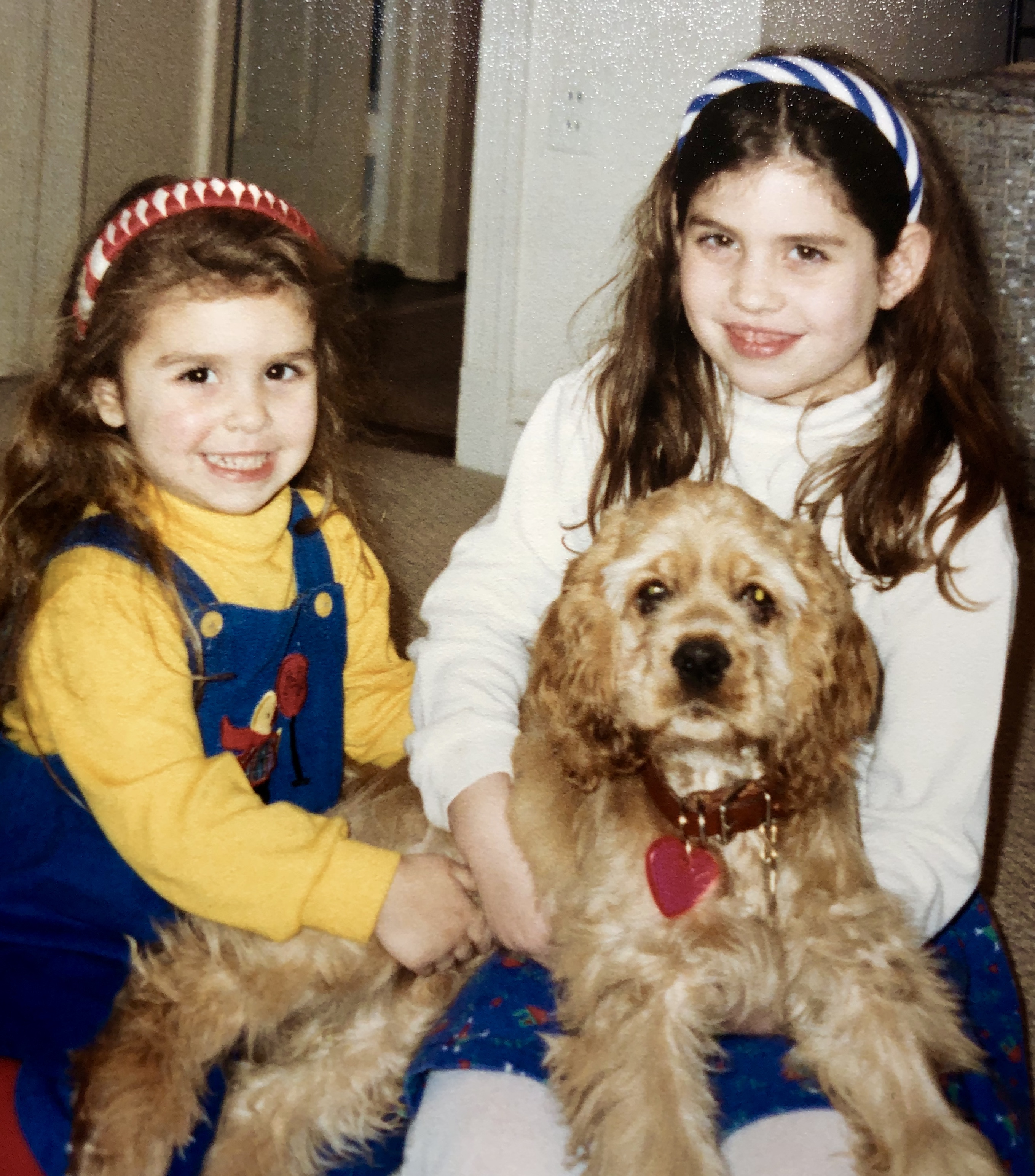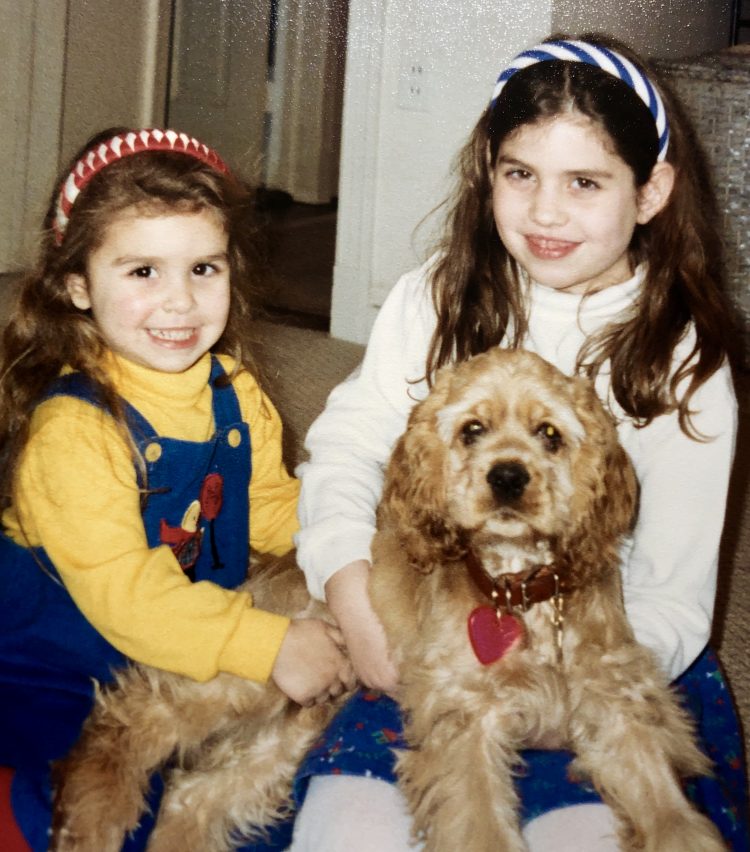
Most parents hear this at some point (in fact, they hear it on a loop that doesn’t stop until somebody – usually the parent – caves.) Having a pet is an important experience for a child because learning to feel empathy for other living things is an essential life skill. Our first dog was a cocker spaniel puppy who came from a puppy mill. I didn’t know what a puppy mill was then – I saw an ad in the paper and brought her home. She seemed to have something wrong with her eyes, but the breeder assured me it would clear up as she got older. Our daughters were ecstatic, and we named her Daisy.
As time passed and we worked on housetraining and basic commands she was very loving and willing, but she couldn’t follow the simplest directions. She also seemed to have very poor vision. After six months of endless accidents we took her to obedience school to get professional help. The trainer took me aside and pointed out that Daisy had an eye problem associated with overbred cocker spaniels – and suggested seeing an eye specialist. He also said that he thought Daisy may have been deprived of oxygen during birth and possibly brain-damaged because they couldn’t teach her anything. We got the eye surgery (though she remained nearly blind.) Several years later, and fortunately for all of us, a close family friend was getting married and moving across country. She offered to take Daisy with her to be a companion in her new life, and I knew she was a patient soul with the time to devote to Daisy.
With two young children in the house, I wasn’t equipped to take care of an animal with such special needs. I felt sorry for her, and so guilty for not doing more to help Daisy. I’ve always felt I let her down. But we were also let down by the breeder, and a system that lets people breed animals indiscriminately for profit.
If you’re thinking about adopting a pet, here are a few things to consider:
- If you don’t want the kind of experience we had with our Daisy, avoid puppy mills or pet stores that sell puppies from puppy mills. Some of the greatest animal abuse in the country goes on in puppy mills, where dogs spend their lives in tiny cages, with little or no medical care or socialization with humans. Many have serious medical issues from being over- or in-bred, and they are sold at exorbitant prices to unsuspecting consumers who find their sweet puppy is a sick dog requiring lots of extra effort and expense. It’s a terrible thing to bring home a dog that your family falls in love with, only to have them taken from you or paralyzed by an illness caused by over-breeding.
- Puppies and kittens, while adorable and fun, are a lot of work. They need extra time and attention in the same way that babies do, so if you’re not up for that, a more mature dog is a better choice. Mature dogs are usually more calm, likely to be housetrained already, and so grateful to find a good home that you have to see it to fully appreciate the level of gratitude they exude.
- Be prepared to train your dog. Many dogs in shelters are young animals who, through no fault of their own, have been purchased by people who know nothing about how to raise and train an animal. They blame the animal when they misbehave, but they haven’t done anything to teach them how to behave, so those dogs are dumped in shelters where they won’t be adopted – because they’ve already developed behavioral problems from their previous owners that frighten off possible adopters.
- Beware the internet, where unscrupulous breeders sell their animals! If you want to find a particular type of dog, go to a website like https://www.gooddog.com, which vets good breeders and healthy rescue dogs.
- Be aware that all animals need medical care and there are costs associated with that. It’s far less expensive to keep a dog or cat current on its vaccinations than it is to treat them after they’ve become ill. If you love your pet, you don’t want them to suffer unnecessarily. Many animals are dumped at shelters when their medical issues become too extreme and expensive for owners to deal with, despite the animal’s years of loyal companionship. If you can’t afford an animal, by all means, please don’t get one. It’s the humane thing to do. Which leads me to this:
- The time commitment. Dogs and cats can live fifteen years or more, rabbits ten years, hamsters two years. Puppies are not Christmas toys any more than bunnies are Easter surprises. The idea of a pet is different from the responsibility of it. They aren’t toys, but living creatures who rely on us for their safety and wellbeing.
Did you know that since Game of Thrones has been on the air there’s been a flood of people buying huskies – because who doesn’t want a Direwolf? This enthusiasm has been followed by a flood of purebred huskies being dumped at animal shelters after their owners realized that huskies are not care free. They shed bagsful of hair twice a year, they howl at the moon, they dig holes in the yard; my little half-huskie has dug multiple holes at every entrance to our house, not just for a spot to keep cool, but because he’s being a good watchdog. We learn to make adjustments for pets, just like we make adjustments for the people we love.
As much as I wish all dogs in shelters could find good homes, having a pet is not for everyone. You might not be ready now, but maybe someday you will. There’s no judgement here – it’s a matter of understanding yourself and your living circumstances. If any of the items listed above give you pause – don’t be a pet owner – yet.





